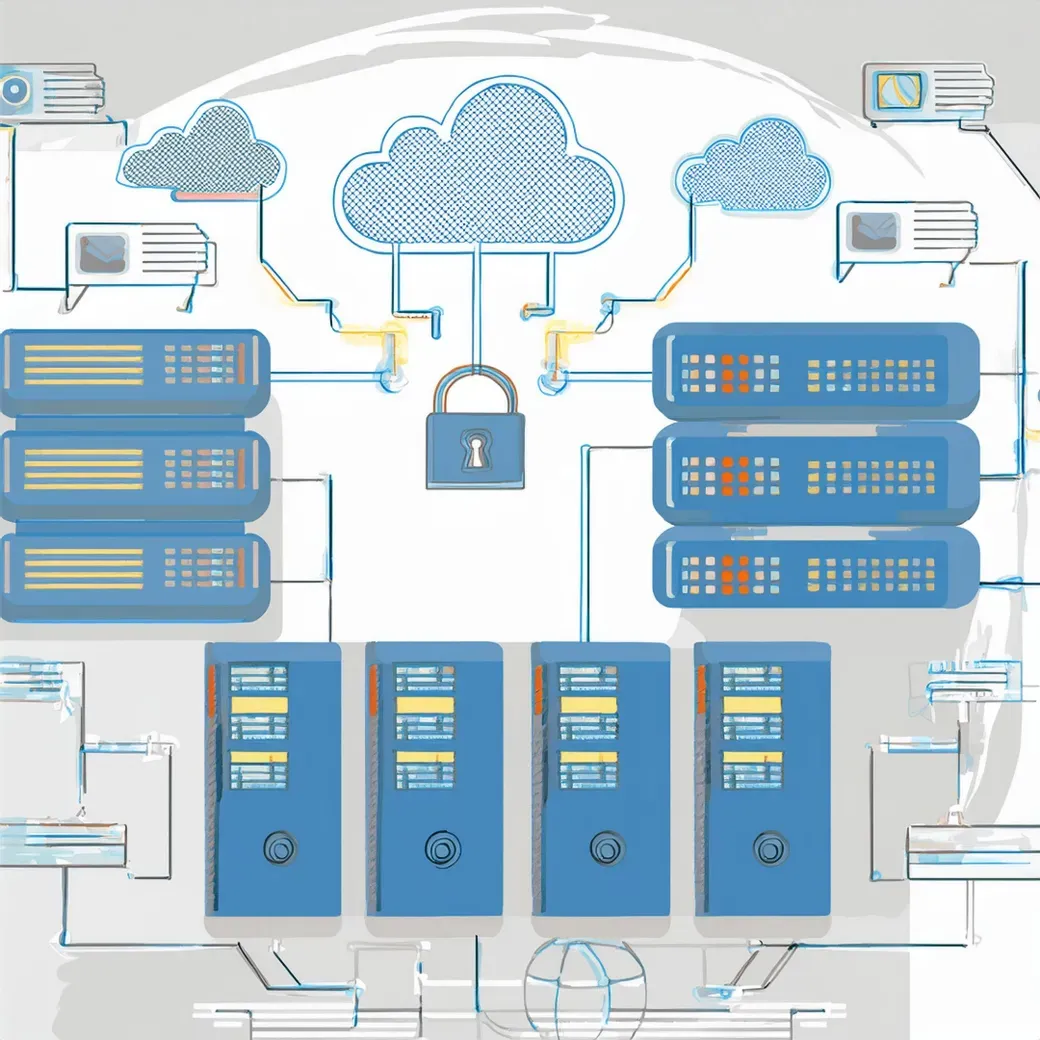What I wish I'd known...
If there is anything I could tell my former self in terms of this career, it is that a network and/or systems administrator cannot just be adept with technical skills, but also must be proficient with project and time management.

Hi there, my name is Jeremy.
As a Network and Systems Administrator, I have gained extensive knowledge regarding the reliable and secure installation, configuration, and maintenance of various components within the infrastructure stack. Throughout my tenure in enterprise environments, I have acquired a wealth of technical knowledge and cultivated the soft skills required to see projects through.
Please fee free to visit my portfolio to further demonstrate my value.
"What would ya say..ya do here?" --The Bobs; Office Space

Network Engineering
Building, maintaining, improving, and securing the network stack requires expert knowledge, serving as the blueprint for a stable and efficient infrastructure. As I tell my kids: "Network Engineering is similar to our Highway Engineers and road construction crews in which we all rely on to aid us in getting to and from place to place safe and sound." The same goes for any administrator responsible for a corporation's network. Ensuring high availability, dependability, security, and efficient speeds are all necessary to give us a durable backbone.

Systems Administration
As your systems administrator, my responsibility is all about building, maintaining, securing, and educating all members of the organization of the tools available to help them do their job. It is imperative that the technology stack runs like a well-oiled machine. Coordinating and fine-tuning complex systems to ensure they work together flawlessly requires steadfast devotion and professional composure. Solving problems, collaborating with your team, and keeping everyone in the loop will be key to my and the organization's overall success.

Project Management & Team Leadership
One of my core beliefs for holding a Network/Systems Administrators role, is to master project and time management techniques. Poor management in these areas can impact individuals, organizations, and stakeholders. It is also part of my foundation to be empathetic and patient when providing services, as this plays a vital role in developing junior team members' knowledge and skills, while enabling the team's growth and full potential.
"Honest, hardworking, and does not cut corners."
You cannot afford to trust somebody with your infrastructure who is afraid to be honest with you. I can bring realistic, reliable, and unwavering support to any IT team.
Online Interview
What makes you a reliable and qualified Network/Systems Administrator?
Within my skill set, I possess a comprehensive understanding of essential concepts such as time and project management. While technical proficiency and scripting knowledge are valuable, the significance of effective communication and stakeholder engagement is paramount in ensuring successful project outcomes. Maintaining continuous and uninterrupted documentation is critical to the administrator's role. Additionally, keeping abreast of evolving security technologies and practices plays a crucial role. Asset control, awareness, and a profound understanding of antivirus and malware protection for all endpoints are essential. Furthermore, the ability to analyze deep into the TCP/IP stream through packet captures and interpret the findings accurately is vital.
In contemporary society, Network/Systems Administrators shoulder a multitude of tasks and responsibilities. The subject matter is so extensive that it could easily fill several volumes. Among the key areas of focus are virtualization, backups and recovery, monitoring, log analysis, user account management, security roles, authentication, and last but not least, automation. The IT administrator's landscape is both broad and complex, demanding not only a deep and comprehensive understanding of the subject matter but also unwavering perseverance.
What can you tell me about documentation?
This is a key area which any role in any industry can only benefit from... if it is done right. Most organizations have documentation; but I have also observed far too many times that accurate and reliable documentation is almost nonexistent. I have heard all the excuses and would be lying if I did not find myself committing the same infractions in the past.
From the many years of experience and feeling the frustration of inadequate documentation, I have now grounded myself to better record the necessary components of all work done. This will undoubtedly not only best assist me, but all stake holders when it is needed the most.
Do you have any current certifications? "No, but please read on"
Unfortunately, I do not currently hold any certifications. I do, however, understand the importance of them and how it can most certainly assist in the market today. Given this, I am currently working towards my LPIC-1 certification.
Once upon a time, I did attempt the CCNA way back when I first entered the administrators world and sadly I did not pass the exam by only a few points. This, though, cost me $300 out of my own pocket at a time when I needed that money the most and regrettably the corporation I was working for did not reimburse for attempts. I learned a lot from that experience. I was not using Cisco devices nearly enough to get adequate practice. (And yes I worked my way through CCNA study guides/books, along with an awesome course offered by CBT Nuggets.) With that said, please keep in mind this was before online labs and the much needed virtualized network applications that are around today. When you are renting in the Boston area, you are not trying to setup your own hardware of decommissioned routers and switches…although I did try some things 🙂
This of course did not stop me from exploring and researching the many technologies and vendors out there such as Juniper, Brocade, HP/HPE, Cisco, Palo Alto, etc. I tell you this because I hope it is understood that in all the roles that I filled, I was constantly interfacing with multiple vendor devices and their respective operating systems.
In retrospect, I recognize that pursuing professional certifications throughout my career would have been a valuable endeavor. I have learned to use all the major network and firewall vendors including a multitude of white-box/open-switch solutions. This is coupled with the fact that I also have extensive familiarity with a copious amount of open-source router technologies used throughout small and large enterprises world wide.
So why the new initiative to get some certifciations?
It has always been on my mind to certify in various technologies so I can then, at the very least, show the milestones I was able to achieve throughout my career. But then, I never really felt I "needed" to prove my knowledge given that it would all be handled with job interviews and even on-the-job tasks.
The scary truth is, what I am seeing now in this current market is the preference for those with certifications are now more prominent and therefore are able to at least arrive at organizations with at least a "badge" to inform the hiring team that the necessary skills needed for the new role is valid with this candidate.
Even though I know I have an ample amount of exposure and knowledge within the enterprise workplace, I am finding it increasingly hard to get the chance to prove that to the members of the possible new team.
What would be your first steps when joining a new team?
Upon joining an organization, one of the initial tasks I feel to be utterly critical, is to understand the full scope of not only the role in which I will fill, but the team from which I serve . Additionally, it is imperative to grasp the manner in which the team contributes to resolving prevailing challenges and attaining project milestones, thereby facilitating the progress of other members, clients, and stakeholders without constituting an impediment.
Are there any courses you have completed?
Yes, I have completed multiple courses and boot-camps throughout my career:
Global Knowledge:
Cisco
CCNA Boot-camp
Cisco Unified Communications Manager (CUCM)
Juniper
Introduction to Junos operating systems
Junos Intermediate Routing (JIR)
CBT Nuggets: various vendor technologies (Cisco, Juniper, Fortinet, Linux, Windows Server, Project Mgmt., etc.)
Udemy IT related courses
Too many to list here, but use extensively for updated trainings.
What's with the Red Mage association?
For those out there who are role-playing game (RPG) fans, I am certain the option to choose a Red Mage in your party from Final Fantasy 1 (Square/1987/Nintendo) will ring some memory bells.
Among the cast of characters, the Red Mage stands out as a versatile spell caster and combatant, possessing a balance unmatched by any other. Notably, the Red Mage harnesses both light and dark magic while demonstrating proficiency in wielding various weapons and wearing different types of armor, a rare combination of abilities.
I draw a parallel between the Red Mage and my role as an Administrator due to shared characteristics. In both instances, the ability to adeptly navigate the intricate complexities of network and system administration requires significant intelligence and capacity. Furthermore, I associate the Red Mage with the realm of Cybersecurity, particularly in relation to Red, Blue, and Purple teams. The color scheme employed in the site's imagery further reinforces these connections.

Red Mage / Final Fantasy
Among the cast of characters, the Red Mage stands out as a versatile spell caster and combatant, possessing a balance unmatched by any other. Notably, the Red Mage harnesses both light and dark magic while demonstrating proficiency in wielding various weapons and wearing different types of armor, a rare combination of abilities.
